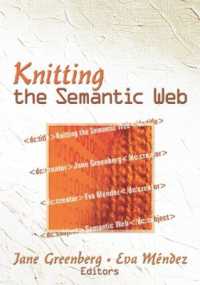- ホーム
- > 洋書
- > 英文書
- > Philosophy
Full Description
This volume tests a hypothesis—philosophy and science are identical forms of behavioristic, organizational psychology: a psychological habit of wondering about causes of organizational existence, formation, and behaviour. Focusing attention on two universal and culturally influential great ideas—freedom and religion—this volume's array of international scholars demonstrate that leading ancient and medieval philosophers did philosophy in this way. Also, well-known philosophers/scientists like Mortimer J. Adler and John N. Deely practiced philosophy this way. Doing so is precisely what made these philosophers uniquely capable of generating great ideas as motivational principles that dramatically alter cultures. In a nutshell, this work offers significant support for its historically and philosophically ground-breaking thesis.
Contents
Acknowledgments
Notes on Editors and Contributors
Introduction
Peter A. Redpath
1 Reflections on Mortimer J. Adler's Teachings about the Great Ideas of Religion and Freedom
Piotr Jaroszyński
2 Free and Religious Actions as Semiotic Effects of the Great Ideas
Maria Joanna Gondek
3 How Commonsense Philosophical Realism Influenced Mortimer J. Adler's Teachings
Joanna Kiereś-Łach
4 Becoming a Masterpiece of Unbending Will
Artur Mamcarz-Plisiecki
5 Karol Wojtyła on Semiotically Expressing the Great Ideas of the True and the Good
Arkadiusz Gudaniec
6 How the Great Ideas Can Help Resolve the Contemporary Decline of the West
Wojciech Daszkiewicz
7 Some Contemporary Problems Obscuring the Greatness of the Great Ideas
Katarzyna Stępień
8 Czesław Martyniak: The Great Ideas as Motivational Causes
Rafał Charzyński
9 The Great Ideas: Causes of Human Transcendence or Enslavement?
Tomasz Duma
10 Christianity: Friend or Foe of the Great Ideas?
Robert T. Ptaszek
11 Semiotics of Organizational Leadership and Gateway Leadership Induction Technology (GATELIT)
Marvin B. Daniel Peláez
12 Greatness of Character in Classical Confucianism
Jason Morgan
13 The Great Ideas in the Noble Buddhist Doctrine of Liberation
Adam L. Barborich
14 Mortimer J. Adler
From Annoying Philosophical Bastard to Great Educational Reformer
Imelda Chłodna-Błach
Conclusion.
"Leisure Is the Basis of Culture": Was Josef Pieper Wrong?
Peter A. Redpath
Index








